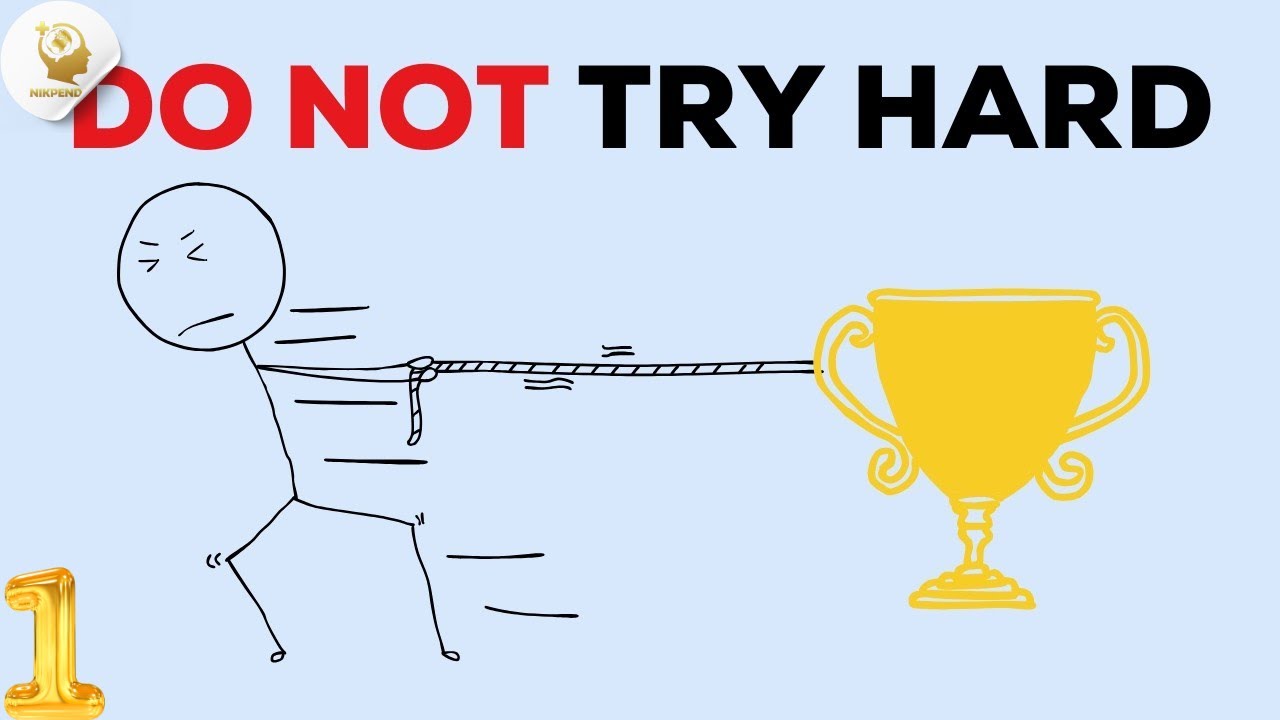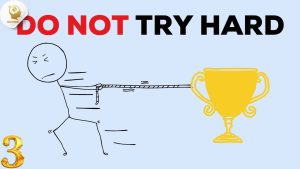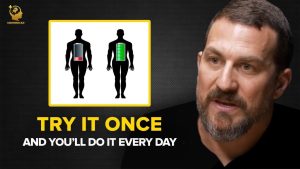
Beginner
- Task 1: My Opinion The speaker says life is “laughably simple.” Do you agree or disagree? Tell a partner or the class your opinion. You can say: “I agree that life is simple because…” or “I disagree that life is simple because…”
- Task 2: Explain a Key Word After watching the video, choose one of these words and explain its meaning in your own words. Use a simple example if you can.
- Simplicity
- Complexity
- Paradox
- Task 3: Give Advice The speaker talks about how we complicate things. Think about something in your life that feels complicated, like doing homework or a sport. Tell a partner what it is and one simple thing you can do to make it easier.
Intermediate
- Task 1: The Effort Paradox The speaker says, “the harder you try, the more you fail.” Do you think this is true? Tell a partner or a group about a time in your life when trying too hard made a situation worse.
- Task 2: The Control Paradox The speaker says you can only control your actions and your reactions. Talk about a time when you tried to control something you couldn’t, like a friend’s opinion or the weather, and what happened.
- Task 3: Simple Advice for a Friend Imagine a friend comes to you with a problem. They are overthinking and overcomplicating things. Using ideas from the video, give them some simple, direct advice.
Advanced
- Task 1: Defend the Argument The speaker says “life rewards the relaxed, not the lazy.” Prepare a short speech to a group or the class where you defend this statement. Use examples from the video and from your own life to show that being relaxed is more effective than being lazy.
- Task 2: The Night Shift The speaker talks about the brain’s “secret night shift.” Discuss with a partner how understanding this process affects your own view of sleep. What changes will you make to your routine based on this information?
- Task 3: Debate the Analogy The speaker compares life to a surfer riding waves. In a debate, argue for or against this analogy. Is it a good way to think about life? Why or why not? Use specific examples from the video to support your points.
Beginner
- Task 1: Listen for Numbers Watch the video and write down any numbers you hear.
- How many pages are most self-help books?
- How many steps is the morning routine mentioned?
- How many years ago did the Stoics figure out the control paradox?
- Task 2: Find the Simple Advice Watch the video and listen for the simple advice the speaker gives for these topics. Write down the advice in your own words.
- For relationships:
- For success:
- Task 3: Brain Facts Listen for the speaker’s discussion about the brain. Can you find one fact about the brain and say it out loud?
Intermediate
- Task 1: The Three Paradoxes The speaker talks about three paradoxes. Listen to the video and write down the names of these three paradoxes. Then, choose one and explain it in your own words.
- Task 2: Listen for Analogies The speaker uses several analogies to explain complex ideas. Listen and identify the analogy used for each of the following ideas. Then, explain why the analogy works.
- Trying to control everything:
- The brain’s cleaning process:
- Task 3: Complete the Sentence Listen for the speaker’s main points and complete the following sentences.
- The more you want something, the more it __________.
- Life rewards the __________, not the __________.
- You can only control two things: your actions and your __________.
Advanced
- Task 1: Listen for Core Concepts Listen to the entire video and identify the core concepts behind the speaker’s message. Explain how the concepts of “simplicity,” “the backwards law,” and the “circle of influence” are connected.
- Task 2: Analyze the Tone Listen to the speaker’s tone of voice throughout the video. How does the tone change from the beginning to the end? What emotions or attitudes do you hear in their voice (e.g., excitement, frustration, calm)?
- Task 3: Summarize and Critique Watch the entire video. First, summarize the speaker’s main argument in 3-4 sentences. Then, provide a short critique of the speaker’s viewpoint. Do you think the speaker’s message is too simple? Is there anything they left out?
Beginner
- Task 1: Read for Numbers Read the video and write down any numbers you find.
- How many pages are most self-help books?
- How many steps is the morning routine mentioned?
- How many years ago did the Stoics figure out the control paradox?
- Task 2: Read for Simple Advice Read the video and find the simple advice the speaker gives for these topics. Write down the advice in your own words.
- For relationships:
- For success:
- Task 3: Brain Facts Read the section about the brain. Can you find one fact about the brain and write it down?
Intermediate
- Task 1: The Three Paradoxes The speaker talks about three paradoxes. Read the video and write down the names of these three paradoxes. Then, choose one and explain it in your own words.
- Task 2: Read for Analogies The speaker uses several analogies to explain complex ideas. Read the video and find the analogy used for each of the following ideas. Then, explain why the analogy works.
- Trying to control everything:
- The brain’s cleaning process:
- Task 3: Complete the Sentence Read the video and complete the following sentences.
- The more you want something, the more it __________.
- Life rewards the __________, not the __________.
- You can only control two things: your actions and your __________.
Advanced
- Task 1: Read for Core Concepts Read the entire video and identify the core concepts behind the speaker’s message. Explain how the concepts of “simplicity,” “the backwards law,” and the “circle of influence” are connected.
- Task 2: Analyze the Tone The speaker has a specific tone in the video. Read the text and describe the tone. How would you describe the speaker’s attitude or feeling about the topic?
Task 3: Summarize and Critique Read the entire video. First, summarize the speaker’s main argument in 3-4 sentences. Then, provide a short critique of the speaker’s viewpoint. Do you think the speaker’s message is too simple? Is there anything they left out?
Beginner
- Task 1: Simple Definitions After watching the video, write a short definition for each of these words in your own words. Use one or two simple sentences for each.
- Simplicity:
- Complexity:
- Paradox:
- Task 2: The Easiest Way The speaker says many things are simpler than we think. Choose one of the following and write 2-3 sentences about how you think you could make it simpler in your own life.
- Success
- Happiness
- Relationships
- Task 3: A Thank You Note Imagine you are writing a thank you note to the speaker of the video. Write a short note (3-4 sentences) thanking them for the message. Explain one thing you learned from the video that you will remember.
Intermediate
- Task 1: Explain a Paradox The speaker talks about two main paradoxes. Choose one of the following and write a short paragraph (5-7 sentences) explaining its main idea.
- The Effort Paradox:
- The Control Paradox:
- Task 2: My Own Analogy The speaker uses analogies like “holding water in your hands” and “swimming harder to float.” Write a short paragraph describing a difficult situation in your life and create your own simple analogy to explain it.
- Task 3: A Letter to a Friend Write a short letter to a friend who is overcomplicating their life. Use ideas from the video to give them advice. You can tell them to stop trying so hard or to focus on their “circle of influence.”
Advanced
- Task 1: An Expository Essay Write a short expository essay (2-3 paragraphs) on the concept of the backwards law as described in the video. Define it, provide an example from the video (e.g., sleep, happiness, love), and then use a personal example to show your understanding of the concept.
- Task 2: An Argumentative Essay The speaker argues that “life is laughably simple.” Write an argumentative essay (2-3 paragraphs) where you disagree with this statement. Use specific points from the video (e.g., the brain’s complexity, the need for sleep) and your own reasoning to support your position that life is, in fact, complex.
- Task 3: A Journal Entry Imagine you are starting to apply the lessons from the video to your life. Write a detailed journal entry about your own “circle of influence” and “circle of concern.” Identify a problem from your life and explain how focusing on your circle of influence could help you address it. Use a reflective and personal tone.





